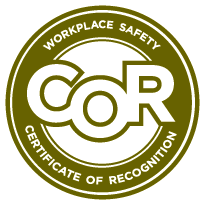Understanding the Different Types of COR Audits:
Certificate of Recognition Seal
Achieving and maintaining a Certificate of Recognition (COR) is a significant step for organizations committed to workplace safety. COR audits are an essential part of the process, helping companies assess, improve, and demonstrate their health and safety management systems. Here’s a breakdown of the different types of COR audits and their purposes.
1. Baseline Audit
The baseline audit is the starting point for any organization beginning its journey toward COR certification. This audit provides a comprehensive assessment of the company’s current health and safety program, identifying strengths, gaps, and areas for improvement.
Purpose: To establish the organization’s health and safety baseline.
Outcome: A roadmap for achieving compliance with COR standards.
2. Certification Audit
The certification audit is the formal evaluation required to earn a COR. Conducted by a certified auditor, this audit assesses the company’s health and safety management system against the COR standards to ensure it meets legislative and best-practice requirements.
Purpose: To verify compliance and grant COR certification.
Outcome: A COR is awarded upon successful completion, valid for three years.
3. Maintenance Audit
Once certified, companies must complete a maintenance audit annually for the two years following their certification audit. These audits are less extensive than certification audits but still thoroughly evaluate key elements of the safety program.
Purpose: To demonstrate ongoing commitment to health and safety and ensure continuous improvement.
Outcome: Maintains the COR certification status.
4. Limited Scope Audit
The limited scope audit is often used in specific situations, such as when a company operates in a limited capacity, has significantly changed its operations, or is preparing for a full certification audit.
Purpose: To focus on specific areas or operations within the health and safety program.
Outcome: Provides targeted feedback and preparation for broader audits or compliance.
Why Understanding the Differences Matters
Knowing the differences between these audit types helps organizations effectively plan their health and safety strategies. Whether you're laying the groundwork with a baseline audit, achieving certification, or maintaining your COR status, each step reinforces a culture of safety and operational excellence.
By investing in the COR process and understanding the audit requirements, companies can not only comply with industry standards but also create safer workplaces for their employees.
Ready to achieve your COR certification with confidence?
ClearPath Safety is here to guide you every step of the way. Our expert HSMS Creation and Review services, paired with comprehensive COR Audit Prep, ensure your health and safety systems meet certification standards. Let us help you build a safer workplace and secure your COR today. Contact ClearPath Safety now to get started!

